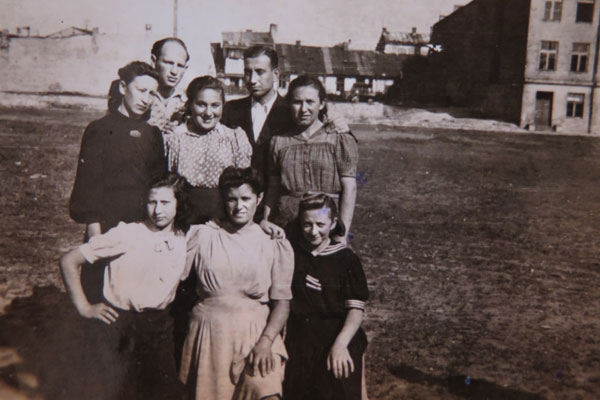
Niusia Borensztajn Nester, center, surrounded by members of the Ichud kibbutz before the Kielce pogrom, 1946. Chilik Weizman, with permission from the family of Niusia Borensztajn Nester
Explore the untold narratives of female heroes of the Kielce pogrom who were killed in the antisemitic attack, as well as those who survived, including survivor Niusia Borensztajn Nester. Niusia ran toward danger and helped care for the wounded, though she was also injured. Built on a decade of research, the speaker will present photos, rarely seen testimonies, and uncensored survivors' depositions. These newly accessible resources provide a social portrait of the civilians involved and the precarious state of Jewish life in Eastern Europe in the immediate aftermath of the Holocaust.
A reception will follow the program. Signed copies of Cursed: A Social Portrait of the Kielce Pogrom, written by the speaker, will be available for purchase before and after the program.
Opening remarks
Dr. Lisa Leff, Director, Jack, Joseph and Morton Mandel Center for Advanced Holocaust Studies
Speaker
Dr. Joanna Tokarska-Bakir, Ina Levine Invitational Scholar, United States Holocaust Memorial Museum; Professor, Institute of Slavic Studies, Polish Academy of Sciences, Warsaw University
Moderator
Dr. Elizabeth Anthony, Director, Visiting Scholar Programs, United States Holocaust Memorial Museum
Discussant/Interpreter
Dr. Ewa Wampuszyc, Translator of Cursed: A Social Portrait of the Kielce Pogrom, United States Holocaust Memorial Museum
This in-person or virtual discussion is free and open to the public. Registration is required to receive the link to watch.
For more information, please contact calendar@ushmm.org.
The Ina Levine Invitational Scholar Award is endowed by the William S. and Ina Levine Foundation of Phoenix, Arizona.
The mission of the Jack, Joseph and Morton Mandel Center, part of the United States Holocaust Memorial Museum, is to ensure the long-term growth and vitality of Holocaust Studies. To do that, it is essential to provide opportunities for new generations of scholars. The vitality and the integrity of Holocaust Studies require openness, independence, and free inquiry, so that new ideas are generated and tested through peer review and public debate. The opinions of scholars expressed before, during, or after their activities with the Mandel Center do not represent and are not endorsed by the Mandel Center or the Museum.
